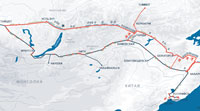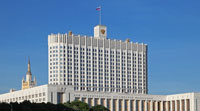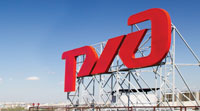Cost optimisation
Total cost optimisation by Russian Railways in 2014 is estimated at RUB 85.5 bln.
Russian Railways has implemented all the necessary measures to cut costs, including: stricter specific fuel and energy consumption rates, improved technologies, downsizing, postponing the indexation of wages until a later period and reducing the volume of major repairs.
Total cost optimisation by Russian Railways in 2014 is estimated at RUB 85.5 bln, including as a result of:
- a 3% downsizing of personnel, the postponement of wage indexation until a later period, a reduction in deductions to the National Pension Fund and the use of part-time work schedules (RUB 27.9 bln);
- continued work to further enhance internal efficiency, including by adhering to a strict pricing policy, the sustainable use of materials as well as a reduction in administrative expenses (general business contracts, travel expenses and communication and exhibition activity expenses, among others) (RUB 20.8 bln);
- generating deferred expenses for the major repair of fixed assets (RUB 32.7 bln);
- improved technologies, stricter specific consumption rates for fuel and energy resources used for train traction and a decrease in the consumption of fuel and energy resources for production needs (RUB 4.1 bln).
Russian Railways utilises part-time employment (52,800 people in November versus 122,500 people on average throughout the year).
The Company continues to perform consistent work to minimise material expenses while complying with the specified product quality level and the deadlines for supply and guaranteeing the sustainability of their production.
Current prices are analysed on a constant basis, the situation on industry-based markets is monitored regularly, negotiations are arranged with existing and potential product suppliers on the feasibility of lowering prices, searches are conducted for alternative supply sources and the feasibility is being studied of additional discounts for products supplied under long-term contracts for which Russian Railways provides counterparties guaranteed supply volumes for an extended period.
In particular, Russian Railways procures fuel and energy resources at reduced prices. Compared with the level of december 2010, measures have been adopted to contain diesel fuel prices (the main type of fuel and energy resource consumed) in contrast with the rates of changes in market prices. The average price decrease for this type of fuel and energy resource relative to the official indices published by the Russian Federal State Statistics Service is estimated at 11% over the period of
It should also be noted that the decline in global oil and petroleum product prices will not result in a corresponding reduction in prices on the domestic market. This can be attributed to the stability of export parity due to growth in the U.S. dollar’s exchange rate versus the rouble and the annual indexation of excise taxes. In addition, the appropriate (seasonal) grades of diesel fuel sold by oil companies at premium prices are purchased during the winter for the Company’s needs.
Despite the challenging geopolitical situation and high level of volatility on global oil markets, the Company purchases petroleum products at below market prices, while the average decrease in the price of fuel and energy resources versus the market level is estimated at 2.5% in 2014.









